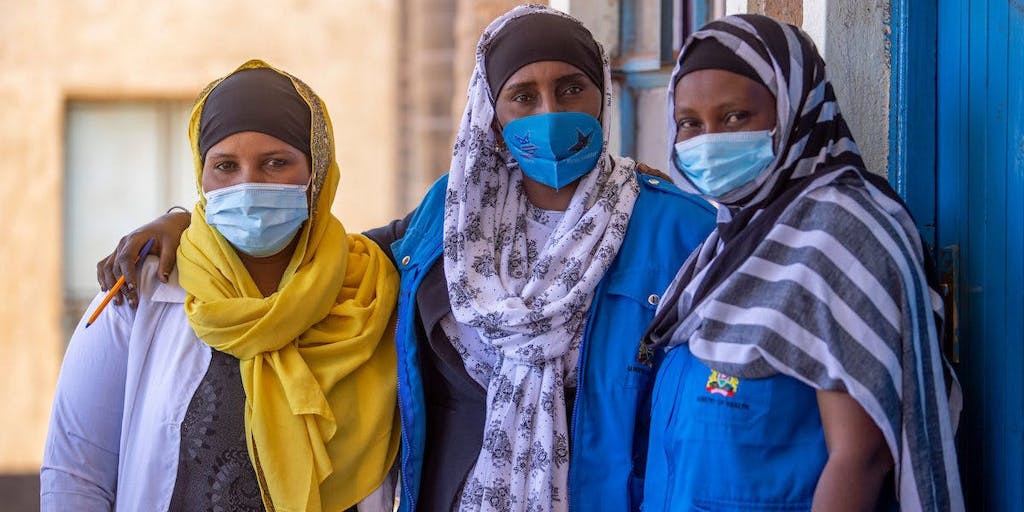We are all experiencing the coronavirus pandemic together. And there are many creative COVID-19 pivots. Such as how we communicate information to how we are connecting with friends and family. We are all doing things differently because of this global pandemic. We asked our staff worldwide to share the creative pivots our teams put into action.
1. Using Local Transport to Spread the Word: Bangladesh
In Bangladesh, FH staff member Sneha Reddy, Sr. Communication Officer, shared COVID-19 preventive awareness messages and voice clips via loudspeakers. Using easy bikes (a common local transport) fitted with the speakers, FH could send messages throughout remote communities. They were able to reach families who do not have access to mobile phones, which were also used to spread information about preventing COVID-19 via calls or text messages.
2. Teacher House Calls: Indonesia
Indonesia reported that teachers showed great dedication in making sure students kept learning. “Some teachers continue teaching their students via home visits. They gather five students in one house and they do it once or twice a week,” said Mesrika Ria Situmorang, an FH Area Coordinator.

3. Remote Data Collection: Kenya
The Kenya team had to adapt some of the approaches to reaching children and communities. “We still need to stay engaged and keep moving the FH vision and mission forward. One of the pivot activities that we undertook is we used remote data collection methods (mainly mobile phones) to gather data and information to enrich our programmatic decision-making process,” said Alex Mwaura, Program Director, FH Kenya.

4. Tippy-Taps for Hand Washing: Burundi
Food for the Hungry encouraged communities to wash their hands frequently because of coronavirus. As a result, community leaders started adding tippy tap wash stations around their homes and common areas to encourage frequent hand washing. FH Burundi staff member Prudence Nahinguvu, Design Monitoring and Evaluation Officer, shared the example that while families had tippy taps installed outside their latrines, they realized they should be washing their hands more often than just after using the bathroom. So families began putting tippy taps at the door to their homes, and especially using them to wash their hands when coming or going out of the house.

5. Sharing is Caring: Rwanda and Guatemala
Sharing what you have with others is one of the greatest acts of kindness. During the pandemic, “People in FH communities supported one another, especially with food items during the lockdown,” said Aloys Gashema, FH Rwanda’s Monitoring and Evaluation Coordinator. Sharing food on a community level is very common in this culture.
Another sharing pivot that was made by beneficiaries in Guatemala is simply sharing their crops. “Some families have shared their crops from their own gardens, with families that don’t have enough,” said Paola Cardona, FH Guatemala’s Communications Coordinator.

6. Virtual Meetings: Indonesia & Kenya
Many countries switched to virtual meetings. Meetings that would typically be held in person had to move to online. FH teams are grateful for video technology to connect teams. “Many of our networking meetings with other partners shifted online and we adjusted to the change,” said Alex Mwaura, Program Director, FH Kenya. Some of these virtual meetings are likely to continue beyond the pandemic. In Indonesia, some staff members live very far from the country office so meeting virtually has helped them be more present in communities and spend more time with their families.
7. Fundraising to Help Those in Need: Guatemala and Bolivia
FH supporters in Guatemala and Bolivia launched campaigns in multiple cities within their countries to raise funds to give food and hygiene supplies to the most vulnerable families. Because COVID-19 prevented in-person events, they fundraised online. They also used local broadcast TV and radio to help spread information. Community leaders organized and coordinated with families. They identified families in greatest need and made sure their immediate needs were met. Bolivia’s efforts reached nearly 10,000 households.

8. Working from Home: Worldwide
Worldwide, FH staff adjusted to a new normal of working from home. According to the Pew Research Center, most working-age adults in the U.S. with at least a bachelor’s degree are working from home as a result of COVID-19. FH staff in Phoenix, Washington, DC, and Nashville, are mainly working from home. And in the early months of the pandemic, many global staff members were also working from home. Our teams have set up home offices and found ways to connect with teams members remotely. And we’ve also been worshiping together virtually.
COVID-19 is affecting every country where FH works. But with your help, FH is able to assist community leaders, churches, and families with creative changes that will keep them safer and fend off hunger during this difficult time. Please see more about FH’s global COVID-19 response and consider donating to our efforts.
Continue reading
Photo Essay: Dinner Tables from Around the World
What People in FH Programs Are Grateful For – Food for the Hungry


